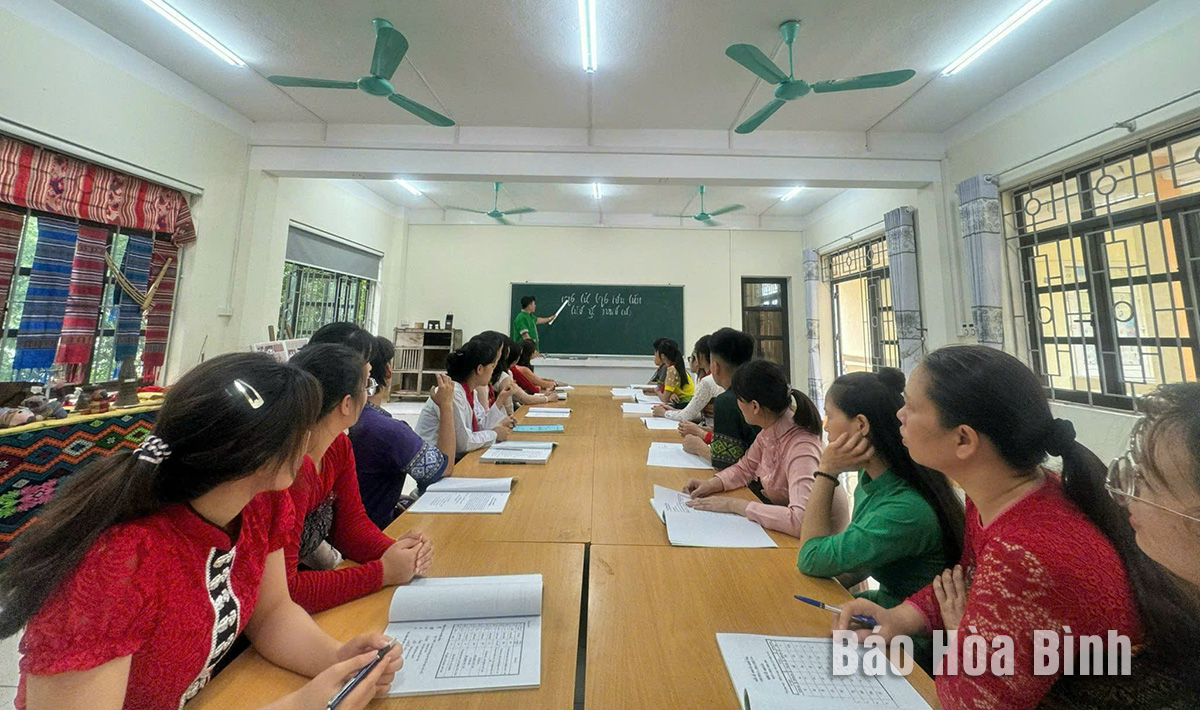
Mai Chau district of Hoa Binh province is home to seven ethnic groups, six of which are minorities. The cultural identities of the ethnic minority groups have been preserved well. One of the district’s effective preservation efforts is the establishment of a cultural preservation club at the Mai Chau Boarding Secondary and High School for Ethnic Minority Groups.
Teachers and students of the school learn about the language of Thai ethnic group when joining the club.
According to the school's Principal Dinh Thi Hao, the establishment of the club was based on surveys conducted among parents and students. Results showed that 215 students or 67% of the total expressed a desire for the school to set up a club that focuses on preserving ethnic cultural identities, with 60% wanting to learn the Thai script. Additionally, all parents agreed to support their children’s participation in the club.
The school sought guidance from local artisans who can share younger generations about cultural values of the Muong ethnic minority people.
Since its inception, the club has held activities on the cultural identities of the Thai, Muong, and Mong ethnic minority groups. Specific activities include inviting artisans to teach the art of playing the "keng loong" (a traditional bamboo instrument) to students. The school has invested in instruments for students to practice, with two teachers and ten students now proficient in playing. The club also organises excursions for students to learn about traditional wax painting from the Mong group in Hang Kia and Pa Co communes.
A dedicated space has been established for club activities, showcasing cultural products and preserving artifacts from the various ethnic minorities in the district. The school has invited artisans to teach the Thai script to students, and members participate in learning about Thai folk songs, the Gau Tao festival, Mong people’s New Year traditions, and traditional brocade weaving.
Evaluating the club's effectiveness, Hao noted that its activities have significantly enhanced the overall educational quality at the school. Students have closer bonds with the school and teachers, while parents have grown more trusting of the faculty. Club members actively collect, stage, and practice traditional dances, instrumental performances, and Thai folk songs. Many folk songs have been rehearsed for school and district events. The club has also trained members in the Xoe dance, which is performed during cultural festivals, holidays, and for tourists.
Students participating in the club recently achieved the fourth place in the provincial young creative science contest with two projects - "Solutions for Promoting Community Tourism Development in Mai Chau through a Bilingual Travel Guide" and "Some Solutions for Preserving and Promoting Mong Ethnic Cultural Heritage." Most importantly, students have gained a deeper understanding and appreciation of their ethnic roots, motivating them to study and improve their skills.
Phong Phu commune, Tan Lac district of Hoa Binh province, is widely regarded as the cultural heartland of the Muong ethnic group. Among its many traditional communities, Luy Ai hamlet (formerly Ai hamlet) stands out as a rare location where the customs and way of life of the Muong Bi people remain largely intact.
The Truong Kha temple festival, a distinctive cultural event held every three years in Vu Ban township, Lac Son district, returned recently with vibrant rituals and folk traditions of the Muong people. Located next to the Buoi River in the Muong Trao fields, the Truong Kha Temple is dedicated to the three Kun Dol deities, revered for teaching farming techniques, irrigation, weaving, and protecting the harvest.
The demand for spaces serving community activities of residents in various areas across Hoa Binh city has been satisfied as local cultural houses now feature modern, spacious facilities thanks to the effective implementation of Resolution No. 49/NQ-HDND issued on December 28, 2021 by the city People's Council, which approved the plan for reorganising, converting, and allocating land for the construction, repair, and expansion of cultural houses in Hoa Binh’s villages and residential areas until 2025.
At the end of May, the Hoa Binh Provincial Ethnic Arts Troupe organized a series of performances for residents in Region 2 and Region 3 communes across the province. Bringing art to ethnic communities in remote, isolated, and especially disadvantaged areas has become a meaningful activity. These are not merely artistic performances but also journeys to disseminate cultural values, enrich spiritual life, and contribute to preserving the cultural identity of ethnic minorities.



